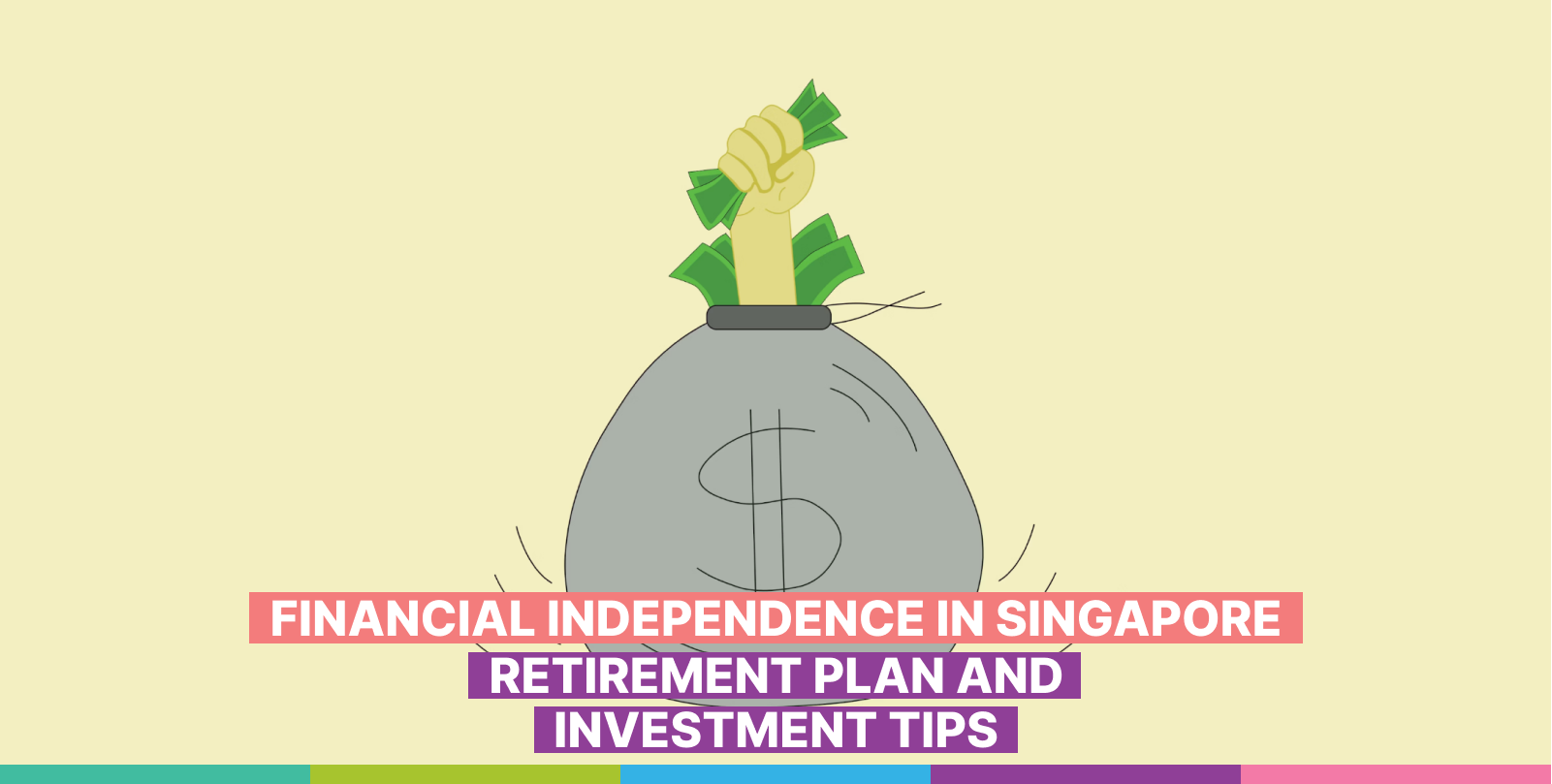
Financial Independence in Singapore: Retirement Plan and Investment Tips
Understanding Financial Independence in Singapore

- Financial independence in Singapore means having enough savings, investments, and passive income to cover your living expenses without needing to work actively.
- The ability to choose when to stop working or retire
- Having more than enough savings to spend on needs and wants
- Maintaining one’s current lifestyle for at least 12 months in the face of unexpected events
- Being able to manage rising costs and inflation
- Meeting monthly savings goals after paying off bills and loans
The Cost of Living in Singapore

To understand what financial independence looks like in Singapore, it’s crucial to consider the cost of living. For a family of four, monthly living costs before rent are around S$6,426 per month or S$77,112 per year [1].
Utility bills for a small apartment average between S$150 to S$300 monthly.
This does not take into account of housing cost. Most Singaporeans stay with their parents till they get their own apartment. Young families will need to take into account mortgage commitments.
These figures highlight the substantial costs associated with living in Singapore, emphasizing the importance of robust financial planning for those seeking independence.
Retirement Planning in Singapore

A solid retirement plan is fundamental to achieving financial independence. Here are key considerations:
Calculating Retirement Needs
Retiree households need an estimated S$2,349 a month to maintain a modest to comfortable lifestyle. [2]
Retirement Schemes and Products
- CPF LIFE: This annuity scheme provides Singaporeans with monthly payouts for life, starting from age 65.
- Insurance Savings Plans: Products that offer monthly cash payouts to supplement retirement income. These may include annuities or maturity pay out from endowment plans.
Investment Tips for Financial Independence

To maintain and grow wealth for financial independence, consider these investment strategies:
- Diversification: Distribute investments among different asset classes to mitigate risk.
- Start Early: Leverage the power of compound interest by investing as early as possible.
- Regular Savings: Consistently set aside a portion of income for investments.
- Low-Cost Index Funds: These offer broad market exposure with lower fees.
- Real Estate Investment: Consider REITs or property investments for passive income.
- Continuous Education: Stay informed about market trends and investment opportunities.
Achieving Financial Independence: Current Statistics
While specific data on financial independence in Singapore is limited, we can glean insights from various sources:
Based on the latest available data from the Singapore Department of Statistics, the individual median gross monthly income for full-time employed residents in Singapore as of 2024 was S$5,500, including employer CPF contributions [3]. This figure represents a significant increase from S$5,197 in 2023, showing a year-on-year growth of approximately 5.8%
Based on the latest available data from the Singapore Department of Statistics, the individual median gross monthly income for full-time employed residents in Singapore as of 2024 was S$5,500, including employer CPF contributions [3]. This figure represents a significant increase from S$5,197 in 2023, showing a year-on-year growth of approximately 5.8%
The income data also shows variation across age groups, with the highest median monthly income of S$7,498 observed in the 45-49 age group. Income tends to peak between the ages of 40-49 before declining in later years.
The median gross monthly income by age group in Singapore for 2024 is sourced from the Labour Force in Singapore 2024 report by the Ministry of Manpower (MoM), The data shows:
20–24 years: $3,269
25–29 years: $4,680
30–34 years: $5,870
35–39 years: $7,049
It’s worth noting that these figures represent gross income, which includes employer CPF contributions. The actual take-home pay would be lower after accounting for employee CPF contributions and taxes [4].
The National Financial Capability Survey (NFCS) 2021, commissioned by the MoneySense Council and conducted by the National University of Singapore, provides insights into Singaporeans’ financial behaviors and attitudes. However, it does not specify a sum required for financial freedom.
The concept of financial freedom is subjective and can vary significantly based on individual circumstances and lifestyle choices. Government agencies tend to focus on more concrete measures of financial well-being, such as retirement adequacy and emergency savings, rather than the broader concept of financial freedom. It’s important to note that individual circumstances can vary significantly. Factors such as income level, lifestyle choices, and investment returns play crucial roles in determining when one can achieve financial independence.
Examples of Financial Independence in Singapore
While individual cases of financial independence are not widely publicized, there are general patterns and examples we can consider:
High-Income Professionals: Doctors, lawyers, and executives in multinational corporations who practice aggressive saving and investing strategies often achieve financial independence in their 40s or 50s.
Successful Entrepreneurs: Business owners who have built and sold successful companies may achieve financial independence at a relatively young age.
Property Investors: Those who have invested in multiple properties during Singapore’s real estate boom may have achieved financial independence through rental income and property appreciation.
FIRE (Financial Independence, Retire Early) Adherents: A growing community in Singapore follows the FIRE principles, aiming to retire in their 30s or 40s through extreme saving and strategic investing.
Preparing for Financial Independence

To prepare for financial independence in Singapore, consider the following steps:
- Assess Your Current Financial Situation: Calculate your net worth and monthly expenses
- Set Clear Financial Goals: Determine how much you need for your desired lifestyle in retirement
- Set a Budget: Monitor your expenses and pinpoint areas where you can reduce spending.
- Build an Emergency Fund: Aim for 3-6 months of living expenses in easily accessible savings
- Maximize CPF Contributions: Take advantage of the interest rates and tax benefits offered by the CPF system
- Invest in Your Skills: Continuously improve your employability to increase your earning potential
- Explore Additional Income Streams: Consider side hustles or passive income opportunities to accelerate your journey to financial independence
What Financial Independence Enables
- Choose to work on projects you’re passionate about without financial pressure
- Travel extensively without worrying about leave days or job commitments
- Pursue hobbies and interests that may have been sidelined during your working years
- Spend more time with family and friends
- Contribute to causes you care about through volunteering or philanthropy
- Enjoy peace of mind knowing you’re prepared for unexpected life events
Challenges and Considerations

While the path to financial independence is appealing, it’s important to be aware of potential challenges:
- High Cost of Living: Singapore’s expensive housing and daily expenses can make it challenging to save and invest aggressively.
- Inflation: The rising cost of goods and services can erode the value of savings over time.
- Healthcare Costs: As you age, medical expenses can increase significantly, potentially impacting your financial independence
- Longevity Risk: With increasing life expectancy, there’s a risk of outliving your savings
- Market Volatility: Investment returns can be unpredictable, affecting the growth of your nest egg
Conclusion
Achieving financial independence in Singapore requires careful planning, disciplined saving, and strategic investing. While the high cost of living presents challenges, it’s possible to reach this goal through a combination of prudent financial management, smart investment choices, and potentially exploring multiple income streams.
Start early, staying informed. Establish a long term trusting relationship with your financial planner to chart your way to gaining financial independence.
The article above should not be taken as financial advice. Investments and their corresponding products have risks. Please seek advice from a financial adviser representative before making any investment decisions. In the event that you choose not to seek advice from a financial adviser representative, you should consider whether the investment or product in question is suitable for you.
